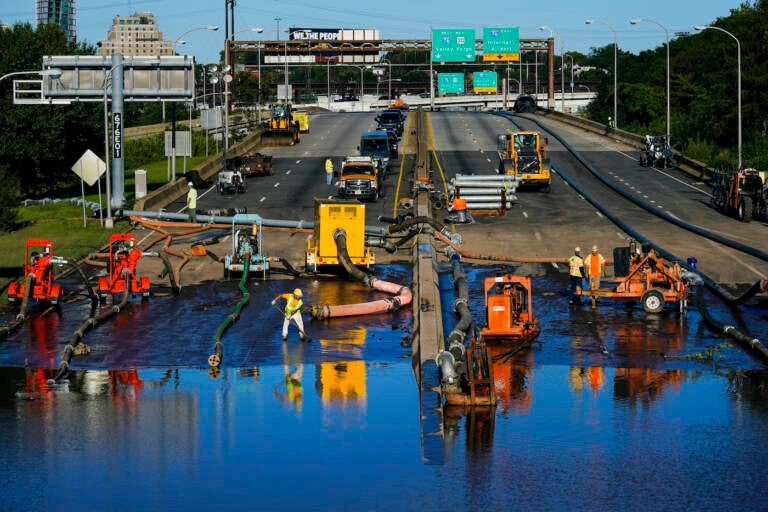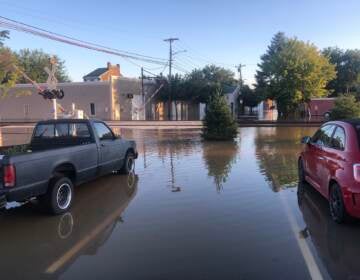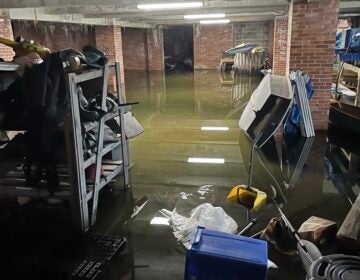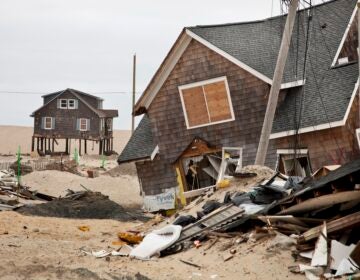Philadelphians have gotten more Ida aid than residents of any other Pa. county
FEMA’s Individual Assistance program helps households pay for repairs to property damaged in disasters like Ida. The deadline for applications is Jan. 10.

Workers pump water from a flooded section of Interstate 676 in Philadelphia Friday, Sept. 3, 2021. (AP Photo/Matt Rourke)
If your car, home, or appliances were damaged by the remnants of Hurricane Ida, you could get thousands of dollars in assistance from FEMA, but time is running out to register.
Philadelphians — along with residents of seven other Pennsylvania counties — are eligible for FEMA’s Individual Assistance program because of a federal disaster declaration. The remnants of Ida brought at least seven tornadoes to the Philly area, killed several people in the region, devastated businesses in Manayunk and filled Center City’s Vine Street Expressway like a bathtub with brown floodwaters.
The Individual Assistance program helps households pay for repairs to property damaged in disasters like Ida, and the deadline is next month.
“Get into the system if you haven’t done so already,” said John Donahue, who is handling Individual Assistance for Ida at FEMA’s Philadelphia region office. “We’ll see what we can do to help you recover from the disaster.”
As of the end of November, more than 43,200 Philadelphia households had applied for the aid and received a total of over $47 million, according to FEMA. That’s the majority of registrations statewide, where more than 63,500 households in eight eligible counties had applied and received more than $71 million. Donahue said at the beginning of December that FEMA was still receiving close to 1,000 new registrations statewide each day, mostly from Philly. The seven other eligible counties are Bedford, Bucks, Chester, Delaware, Montgomery, Northampton and York.
The goal of the program is not to restore a property to its pre-disaster state, but to make sure a home is habitable and a household has a car to get around, Donahue said.
“Anything that would keep you from living in the house — a door being blown in, or windows being busted from the floodwaters pushing them out, or maybe your foundation collapsed due to the water,” he said. “There may be some funding to help with that.”
Housing-related assistance can include help paying rent if you’re displaced from your home or money for home repairs. FEMA will only pay to help with repairs at a primary residence and will not pay for any costs already covered by insurance.
Individual Assistance can also pay for personal property, like a damaged car, if it’s your only source of transportation, clothing, a refrigerator or a TV.
A household can get up to $36,000 in housing-related assistance and up to $36,000 for personal property — but that’s not the norm, Donahue said. The average household in Pennsylvania has received $3,600 for housing assistance and $1,000 in other assistance after Ida. There are no income limits on the program.
Individuals can apply by phone at 1-800-621-3362, but FEMA officials say the fastest way is to apply online at DisasterAssistance.gov, by computer or mobile device. The initial registration takes just around 20 minutes, Donahue said. FEMA operators are available until 11pm each day to help.
To apply, you’ll need to provide the following information:
- The address of your damaged home
- Directions to your property
- Your Social Security number or that of a minor child in your household
- Your annual household income
- The condition of your damaged home
- Insurance information, if available
- A phone number where you can be contacted and an address where you can get mail
- Bank account information, including an account number and bank routing number, if you want to set up direct deposit
Later, an inspector will visit your property to confirm the damage.
FEMA money can get to an applicant’s bank account within 7-10 days, said Donahue.
The deadline for eligible Pa. residents to apply for Individual Assistance is Jan. 10, 2022.
“Once you’re registered, you don’t have to complete the process if you decide you don’t want to go through it,” FEMA spokesperson Renee Bafalis said. “But if you’re not in the system and that timeframe comes, you have no alternative to go back and go into the system again.”
SBA Loans
For property damage that FEMA does not cover, businesses, private nonprofits, homeowners and renters in the same eight counties can apply for disaster loans through the Small Business Administration.
Businesses can get loans of up to $2,000,000 for the repair or replacement of real estate, inventories, machinery, equipment and other physical losses and up to $2,000,000 to alleviate economic injury caused by the disaster, according to SBA. Loans to homeowners or renters for repairing or replacing disaster-damaged real estate can be up to $200,000, and for personal property, including cars, up to $40,000.
Applicants must meet certain requirements around credit history, ability to repay the loan, and collateral.
To apply for one of these loans, first register with FEMA at DisasterAssistance.gov, or call 800-621-FEMA. Then apply through SBA’s website or submit an application by mail. You can call SBA at 800-659-2955 for information and loan applications, or get help in-person at an SBA Business Recovery Center located at the Falls of the Schuylkill Library through Dec. 10.
“If you suffered a physical loss and you’re waiting to hear from insurance, please don’t do that,” said SBA spokesperson Dorris Evans. “Just go on and apply.”
By the end of November, more than 1,500 households and more than 200 businesses in Philly had applied for disaster loans, according to SBA. Just 257 households and nine businesses had been approved, for loans totaling more than $7.4 million.
SBA focused its in-person outreach about the loan program to businesses in Center City and Manayunk, said Karen Knapik, a public affairs specialist with SBA’s Office of Disaster Assistance. Many of the businesses that applied are located in these areas, she said.
The loans are low-interest, with rates as low as around 1.5% for homeowners and renters, so they’ll be cheaper in the long run than putting repairs on a credit card, Bafalis said.
“If they don’t apply for them, then down the road, they’re stuck with a very large bill,” she said. “It may be a little bit time-consuming, but it really is beneficial in the long run just to know whether or not you’re eligible.”
The deadline for businesses, households, and nonprofits to apply for physical damage loans through SBA is Jan. 10, 2022. Businesses can also apply for Economic Injury Disaster loans through June 10, 2022.
FEMA Public assistance
States and municipalities are also eligible for a type of FEMA aid called Public Assistance, which reimburses governments for expenses like police and fire overtime during disasters or repairs to damaged infrastructure.
Philadelphia officials estimate the remnants of Hurricane Ida cost the city around $31 million in expenses and losses. The greatest costs were damage to infrastructure, such as parks, trails, and water department facilities, said Carolyn Caton, deputy director for planning in the city Office of Emergency Management.
The city is in the process of developing its application for Public Assistance, which will go through the Pennsylvania Emergency Management Agency (PEMA) before heading to FEMA. FEMA’s registration deadline for Philadelphia is Dec. 13, and city officials are on track to meet application milestones in order to recoup any eligible costs, Caton said.
The city also plans to apply for a Hazard Mitigation Grant program linked to the Ida disaster declaration, for planning and projects that will help the city weather future disasters with less damage.
 WHYY is one of over 20 news organizations producing Broke in Philly, a collaborative reporting project on solutions to poverty and the city’s push towards economic justice. Follow us at @BrokeInPhilly.
WHYY is one of over 20 news organizations producing Broke in Philly, a collaborative reporting project on solutions to poverty and the city’s push towards economic justice. Follow us at @BrokeInPhilly. 
Subscribe to PlanPhilly
WHYY is your source for fact-based, in-depth journalism and information. As a nonprofit organization, we rely on financial support from readers like you. Please give today.









